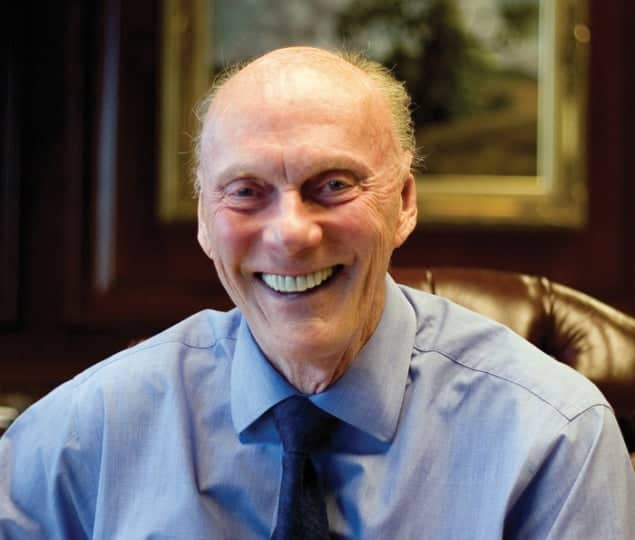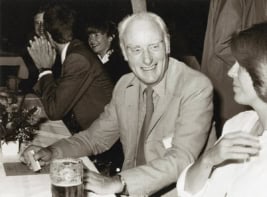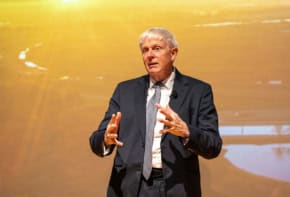
The Norwegian-born physicist and philanthropist Fred Kavli has passed away at the age of 86. Kavli, one of physics’ biggest benefactors, set up the Kavli Foundation in 2000 that has endowed research institutes at leading universities worldwide. Today, there are 17 such institutes around the world dedicated to astronomy, nanotechnology, neuroscience and theoretical physics. Kavli died at his home in Santa Barbara a year after contracting cholangiocarcinoma, a rare form of cancer.
Speaking to Physics World in 2007, Kavli said that physics was, for him, “the most interesting and fascinating subject because it deals with the most fundamental questions and forms a foundation for most science because it [gives] us an understanding of nature, the universe and the world in which we live”.
Cambridge University astrophysicist Martin Rees told physicsworld.com that he first got to know Kavli through the latter’s “generous” backing for the Kavli Institute for Cosmology at the University of Cambridge, as well as through his support for the Royal Society. “[Kavli] believed fervently in the value and potential of fundamental science,” says Rees. “His foundation – now a permanent memorial to his vision – succeeded because he chose excellent advisors and staff, and also because he had a genuinely global vision.”
From missiles to nanoscience
Kavli was born in 1927 on a small farm in Eresfjord, Norway. He chose to study physics at the Norwegian Institute of Technology (now known as the Norwegian University of Science and Technology) in Trondheim. After he graduated in 1955, Kavli applied for a visa to work in the US. A year later, with visa in hand, Kavli travelled to California, where he became chief engineer of a small firm that designed and manufactured sensors for the Atlas missile – the US’s first successful intercontinental ballistic missile.
Two years later, Kavli founded his own business, becoming head of the Kavlico Corporation, which grew into one of the world’s largest suppliers of sensors for aeronautic, automotive and other industrial applications. He remained chief executive and sole shareholder of the company until it was sold in 2000.
It was then that Kavli turned his focus to philanthropy. He established the Kavli Foundation, which aims to “advance science for the benefit of humanity, promoting public understanding of scientific research, and supporting scientists and their work”. The first such institute – the Kavli Institute for Theoretical Physics – was created at the University of California, Santa Barbara in 2002, and has now been joined by 10 other institutes in the US, one in Japan, two in China and one each in the Netherlands, Norway and the UK. “I realized that I wanted to use the fruits of a lifetime of hard work in an efficient way for the long-term benefit of humanity by supporting basic science,” Kavli told Physics World in 2007.
Hitoshi Murayama, director of the Kavli Institute for the Physics and Mathematics of the Universe at the University of Tokyo that was established in 2012, says that Kavli was “an amazing man of incredible vision”. “[Kavli] believed firmly in the importance of basic science and its long-term benefit to humanity,” adds Murayama. “His passion was contagious.”
Funding more
In 2008 Kavli enlarged the foundation’s activities, setting up the $1m Kavli Prize, which is awarded in three subjects: astronomy, neuroscience and nanotechnology. Each prize is worth $1m and is bestowed every two years.
George Efstathiou, director of the Kavli Institute for Cosmology at Cambridge Univeristy, told physicsworld.com that Kavli’s motivation for the prizes was to generate public interest – particularly in young people – in Kavli’s three favoured areas of science. “Kavli was a visionary figure and a generous and enthusiastic supporter of basic, curiosity-driven, research,” adds Efstathiou. “The Kavli Institutes are [his] way of saying that curiosity-driven research is important”.
Since 2008 Kavli has also established Kavli professorships, Kavli symposia and endowed the AAAS Kavli Science Journalism Awards, which is managed by the American Association for the Advancement of Science. The Kavli Foundation has even helped to fund a new “residential working retreat” for scientists at the 18th-century Chicheley Hall in Buckinghamshire, UK, known as the Kavli Royal Society International Centre. The hall was bought for £6.5m by the Royal Society, part-funded by Kavli himself.
“We will forever be grateful to Fred Kavli – someone who, with the foundation, invested his heart and soul into ensuring that science will make this a better world for future generations,” Robert Conn, president of the Kavli Foundation, said in a statement. “And we will carry forward this mission with the same commitment and dedication that he gave to science and his life.”
- An interview with Fred Kavli appeared in the November 2007 issue of Physics World: “Once a physicist: Fred Kavli”



